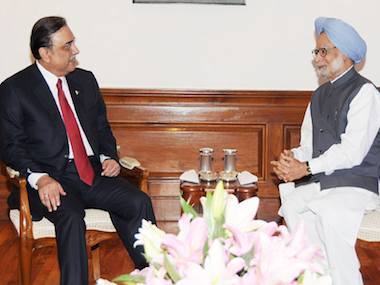Can India and Pakistan use trade as a catalyst for peace? That question assumes significance in the context of the meeting on Sunday between Prime Minister Manmohan Singh and President Asif Ali Zardari, at which they drew up a template for gradual restoration of normalcy in bilateral relations, by focussing on improving trade relations.
Zardari in fact invoked the “India-China model” - under which the two Asian giants have wilfully set their contentious border dispute on the slow track and instead focussed on improving trade links - as one that is worthy of replication between India and Pakistan. That endeavour has seen Sino-Indian bilateral trade accelerate from next to nothing to $60 billion within a decade.
[caption id=“attachment_269512” align=“alignright” width=“380” caption=“Talking peace is the easy bit. AP”]  [/caption]
The sentiment underlying that forward-looking proposal is, of course, noble. So too are the motherhood-and-apple-pie pronouncements about the idiocy of India and Pakistan, two impoverished countries with an enormous unmet developmental challenge, locked in a nuclear arms race.
In normal circumstances, improved trade relations creates a “constituency for peace” in both countries: since any strain - or a shuttering of the borders - directly impacts the bottomline of business that trade across the border, they become stakeholders in peaceable relations.
For the larger trading partner (in this case, India), such a relationship also opens up the possibility of making gains on the political plane. China’s experience of leveraging its enhanced trade relations with Taiwan, the de-facto independent country over which it claims territorial sovereignty, is particularly illustrative.
There was once a time, not long ago, when China was committed to taking Taiwan by military force. In fact, to this day, an array of Chinese missiles are directed at Taiwan, signalling China’s readiness to claim territory by force if necessary. Yet, the more significant gains that China has made in bringing Taiwan into its orbit have been enabled by enhanced trade relations in recent years, after a pro-independence leader was voted out in Taiwan. Today, a more pragmatic Taiwan leadership, profiting from beneficial trade relationship with China, has indicated it would be willing to sign a peace agreement with China.
Impact Shorts
More ShortsYet, for all the merits of enhanced trade relations with Pakistan, there is a risk that the “peace dividend” that can be derived from such an initiative are somewhat overstated.
For one thing, one of the peculiarities of the Pakistani economy is the extent to which the Pakistani military has a grip on the economy. As Pakistani commentator Ayesha Siddiqua notes in her book Military Inc., Pakistan’s military runs a huge commercial empire: its two business fronts are the largest conglomerates in the country, running businesses as diverse as bakeries, farms, schools and private security firms to corporate enterprises such as commercial banks, insurance companies, radio and television channels, fertilizer, cement and cereal manufacturing plants.
In addition, the military monopolises national resources through many other channels.
That may account for why the Pakistani military and its “proxy agents” - including jihadists like Hafiz Saeed - opposed the civilian government’s announcement of the grant of Most Favoured Nation status to India. Their fear is that open trade borders will, over time, loosen the firm grip they have on the economy, and by extension, their hold on power. For that reason, they are certain to create further hurdles in enhancing trade relations. And given the levers that they can control towards that end, their capabilities are virtually limitless. With Pakistani domestic industry too wary of the risk of being swamped by Indian imports, those voices will be amplified manifold.
Second, for the “peace dividend” to filter through requires a fundamental change in the mindset of the Pakistani military complex, the real power centre in Islamabad. The Pakistani military-ISI strategic thinking vis–vis India is still characterised by a cussedness and an unwillingness to give up the use of jihadi terrorists as a “strategic asset” to advance its strategic objectives.
For all the ongoing efforts of Zardari and Pakistan’s civilian government to whittle down the authority of the Pakistani military and the ISI, their battle is far from won. And, as the “test case” of Hafiz Saeed reveals, even the civilian government does not have the political will to rein in Pakistan-based jihadists who target India.
Which is why it may be too early to expect a meaningful “peace dividend” to emerge from the admittedly courageous effort by Pakistan’s civilian government to elevate trade relations with India. Given the paucity of positive news flows in the two countries’ bilateral relations, this moment gives occasion to celebrate the feel-good sentiment arising therefrom. But just don’t hold your breath in anticipation of a ‘peace dividend’. That could be a long while coming.


)

)
)
)
)
)
)
)
)



